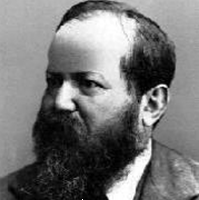
Steinitz vs. Zukertort | World Chess Championship 1886
Dear readers! Over the next couple months I will be doing a series of articles covering the endgames played in world championship matches over the years. Through this series, we will be seeing how endgame play evolved as well as learning about some of the personalities who ruled the chess world of old.
We begin with what is regarded as the first official world championship match, the 1886 contest between Wilhelm Steinitz and Johannes Zukertort, which took place in New York, St. Louis, and New Orleans.
Paul Morphy had died a few years previously, so the chess world felt it could now declare a world champion without the specter of the great Morphy hanging over the title.
Steintz had widely been regarded as the best active player in the world since his 1866 match victory over Adolf Anderssen; while Zukertort, by virtue of his dominating win in the 1883 London tournament — where almost all of the best players in the world competed — was the logical opponent.

Johannes Zukertort was born in 1842 in Lublin, Poland, and later settled in England. One of the best players of the day, his was a natural, attacking style. Although he had a great feel for the game and was an excellent tactician, Zukertort suffered from poor health (he died at 46 years old).
His greatest triumph was his win at the London 1883 tournament. Here we can see an example of his tactical brilliance from that tournament:

Wilhelm Steinitz, born in 1836 in Prague, was the first world champion of chess and is credited with introducing the concept of a "scientific" approach — including the idea that the game is governed by abstract principles. Although he was originally a typical — although great — attacking player of the time, seeking victory in outsmarting the opponent with tactical flair, Steinitz abruptly changed his style in the middle of his career when he began to understand chess on a deeper level than his contemporaries.
We will be looking at the twelfth game of the match. In this game, Steinitz comprehensively out-maneuvered his opponent from a harmless Berlin Defense endgame. Although White's opening play would today not be considered anywhere near critical, it is not immediately obvious exactly where Zukertort went wrong. Steinitz' positional play flowed smoothly, and he simply out-played his opponent.
The players have just entered the endgame. Admittedly, Steinitz approach to Zukertort's Berlin Defense is not exactly threatening. Black has a very pleasant position with his pieces well placed and two bishops. His only weakness, the c7-pawn, is well shielded. But now Zukertort had a basic misunderstanding — he underestimated the importance of the battle for space on the queenside; a battle in which the a-pawns should have played a critical role.
Black had played imprecisely, and from a somewhat better position, he has reached a somewhat worse one. White's position is completely secure, while Black has some weaknesses in the form of the c-pawns. Meanwhile the a6 pawn is very threatening — I described such pawns in an article from a couple years ago, Hammering the Nail. Nevertheless, with simplification imminent, Black should have good chances of drawing. But then came a heavy mistake by Zukertort.
Naturally, Zukertort's blunder 25...Rd7? had a huge influence on the outcome of the game. But a very important lesson can be learned from the advance of White's a-pawn. Rook-pawns are great for gaining space since they only weaken one (rather than two) squares as they advance. Modern players understand this. Thus we can see how you might develop an understanding of chess ideas, a "feel," an intuition.
You will never get the position after move twenty here in your own games — that I can assure you. But you will — frequently — come across positions were a similar idea applies. Perhaps before seeing this game, you would not even be aware of the strength of this a-pawn advance. Or maybe you would underestimate its value. Now in a similar position it would be perfectly natural.
RELATED STUDY MATERIAL
- Read IM Silman's article Johannes Zukertort, Master of Dynamics
- Watch IM Rensch's review of "The Opera Game", Morphy's finest victory!
- Check out GM Dejan Bojkov's video Greatest Chess Minds: Wilhelm Steinitz — Part 1
- Stand firm with Steinitz against Zukertort in Chess Mentor
- Dazzle your opponent after spending time in our Tactics Trainer
- Looking for articles with deeper analysis? Preview our magazine: The Master's Bulletin



